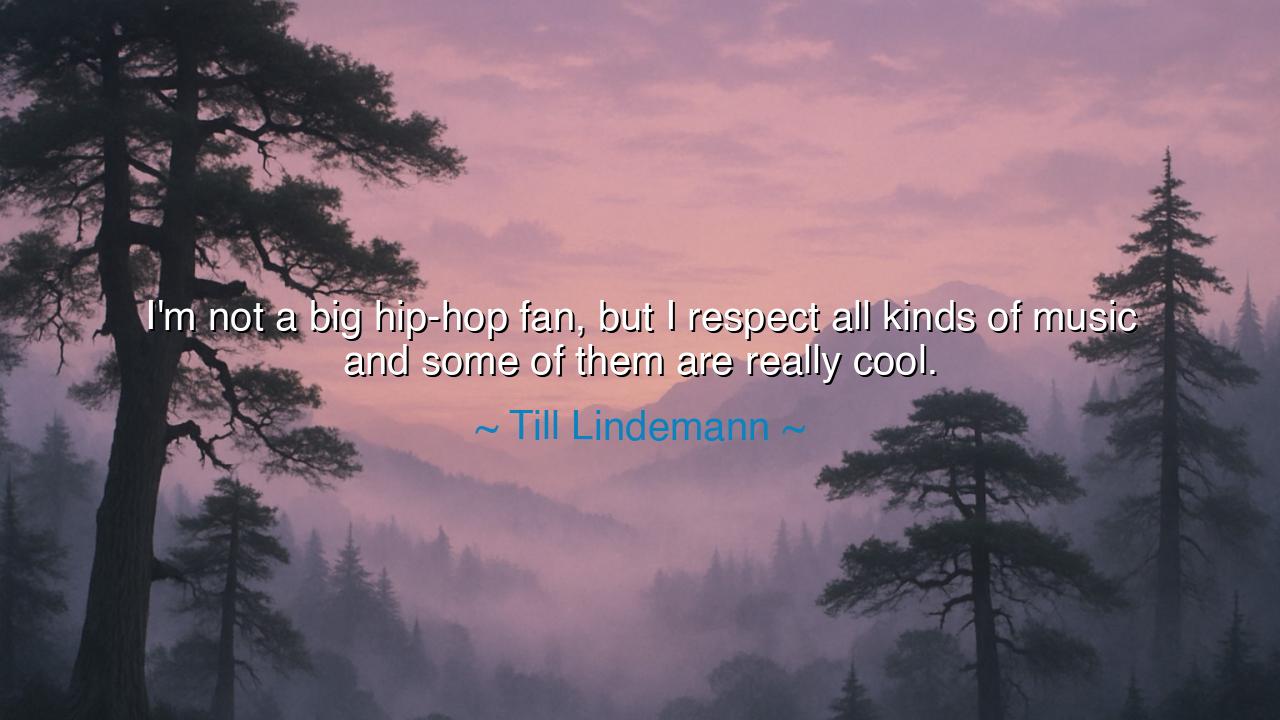
I'm not a big hip-hop fan, but I respect all kinds of music and
I'm not a big hip-hop fan, but I respect all kinds of music and some of them are really cool.






In the great symphony of life, music is one of the most powerful expressions of the human spirit. It transcends barriers of language, culture, and time, resonating with the deepest parts of the soul. Till Lindemann’s words, “I’m not a big hip-hop fan, but I respect all kinds of music and some of them are really cool,” speak to the universal nature of music and the profound truth that while we may not always connect with every form of expression, we must still recognize and respect the richness and power it brings to the world. His reflection is a reminder that true wisdom lies in the ability to appreciate what may not resonate with us personally, and to understand that every form of art serves a unique and valuable role in the tapestry of human culture.
In ancient times, the great philosophers often emphasized the importance of balance and diversity in thought and expression. Plato, for example, in his works on the role of art in society, recognized that music had the power to shape character and influence the very fabric of civilization. But he also knew that different styles of music served different purposes—whether for war, celebration, or ritual. Just as we respect the varied genres of music today, Plato understood that each form was a reflection of the times, the people, and the needs of the moment. In Lindemann’s words, we see this same recognition of music’s multiplicity—though he may not be a fan of hip-hop, he acknowledges its value and coolness, understanding that music’s power lies not in the form, but in its ability to connect us to something greater.
Consider the role of music in ancient Rome, where the grand orchestras of the city played both tragic and celebratory songs that moved the heart and the soul. The Romans, much like modern-day societies, had a great appreciation for the diversity of musical expression—whether it was the solemn tunes played during religious ceremonies or the energetic music of the gladiator games. The appreciation for all forms of music, not merely the ones one was drawn to personally, was central to their understanding of the world. The diversity of music in Rome mirrored the diversity of life itself—filled with joy, strife, love, and loss. In this way, the wisdom of the ancients still applies today: true greatness lies not in dismissing forms of expression that do not resonate with us, but in respecting the power they hold to shape, express, and elevate human experience.
Hip-hop, much like the music of ancient tribes, has its roots in the storytelling traditions of a people seeking to express their experiences, struggles, and triumphs. Born out of the streets, hip-hop became a voice for the oppressed, the unheard, and the marginalized, just as the songs of the oppressed have always been a tool for resistance and empowerment throughout history. Tupac Shakur, one of the greatest voices in hip-hop, used his music not just to entertain but to reveal the injustices of his world. His songs were not only about rhythm and beat; they were about truth, and in this, he echoed the wisdom of the ancients: that music has the power to transform society and bring about awareness where words alone may fail. In recognizing the value of hip-hop, Lindemann is acknowledging its capacity to be transformative, to communicate the stories of those whose voices would otherwise be ignored.
In our modern world, the diversity of musical genres—from classical to jazz, from rock to hip-hop—is a reflection of the diversity of human experience. Each genre serves as a mirror to a different facet of life and emotion, offering us insights into cultures, struggles, and joys that we may never experience ourselves. As Lindemann so wisely points out, we must be open-minded in our appreciation of all art forms, recognizing that coolness is not determined by our personal tastes, but by the ability of that art to resonate with the human spirit. Whether it is a symphony that stirs the soul or a rap lyric that captures the raw essence of life, respect for every form of expression allows us to connect to the larger human story.
The lesson Lindemann imparts is a call to embrace diversity—not just in music, but in life itself. Respecting different expressions of art and culture requires an openness to experience the world through other people’s eyes. To limit ourselves to only those things that align with our immediate preferences is to ignore the richness that the world has to offer. True wisdom comes not in closing off to those things that are unfamiliar, but in seeing the value and beauty in the varied ways that humans express their deepest truths. In our own lives, we must learn to appreciate and respect what we may not fully understand, recognizing that every art form, whether we enjoy it or not, adds to the tapestry of human experience.
So, let us not dismiss the unfamiliar or the unknown, but seek out the stories, the songs, and the voices that speak from different places and different souls. Whether it is through hip-hop, opera, folk, or electronic music, each genre has something to teach us. Let us be open-minded, recognizing that all forms of expression have a purpose—and in doing so, we become part of a more inclusive, understanding, and respectful world. As Lindemann shows us, it is not in our personal preferences that we find the greatness of art, but in our respect for its diversity and the stories it carries.






AAdministratorAdministrator
Welcome, honored guests. Please leave a comment, we will respond soon